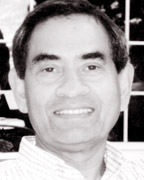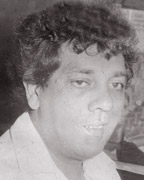Maurice Coomaravel and Trevor de Silva put Sri Lanka’s cycling on map-By A C De Silva
Trevor de Silva
Source:Archives.sundayobserver
CYCLING: Talk of cycling, I mean competition cycling in the past, two names that come to mind in a flash are those of Maurice Coomaravel and Trevor de Silva who stood the test of time to put Sri Lanka on the top rung. In 2008, the Sri Lanka government awarded National Sporting Honours to Sportsmen and Women who had brought credit to the country in the highest international sporting arena. Just two cyclists were included in this prestigious list (which also contained World Cup winning Cricket Team, our Olympic medalits etc). Their names are also in the unique sporting book: Sri Lanka Proud a tribute to Champions.
These two great cyclists are the late Maurice Coomaravel and Trevor de Silva who now lives in London with his wife Anne.
Duo trained together
It is no coincidence that Maurice and Trevor trained together and raced in the 1960s. This period is still considered by many as the golden era of Sri Lankan cycling. This was the period that we saw two of the greatest Sri Lanka sportsmen in action.
The late Maurice Coomaravel, still the only cyclist to have represented the country at an Olympic Games (Rome 1960) and Trevor de Silva – still the only Sri Lankan to have won two International Medals at the 1966 Asian Games in Bangkok in spite of a serious crash during one final. Over 45-years have passed and no Sri Lankan cyclist has even come close to even achieving the standards by these two pioneers.
The late Desmond Goonewardena won a diploma for his 5th place at the same Asian Games, which ranks him as second only to Trevor de Silva’s achievement at international level.
I recently spoke to Trevor de Silva on the phone about cycling in the 1960s.
The combination started in the late 1950s when Trevor, a newcomer to the sport at 17-years joined Spartan Wheelers Cycling Club. Though the were of a similar age, Maurice was already successful amateur and the winner of numerous races. He took Trevor under his wing and guided him through his first major race – the 1960 Olympic trial. He still recalls his first ever 100-mile training ride with Maurice and M.S.M. Lariff. “I could not believe how fast they were riding and I was struggling to keep up and just 6 months later, I was keeping up with them, thanks to Maurice’s guidance.”
Train with good cyclists
Another story Trevor mentioned – his father had told him that to be a first class cyclist he had to train with first class cyclists. So, he said: “Son, you must train with Maurice, because Maurice is in a class of his own,” and that is just what he did.
In the 1960 Olympic trial Trevor comfortably stayed with the leaders. Inspite of an unfortunate crash, at the feed point, at the half way mark, Trevor finished a creditable fourth about eight minutes back. After a stunning victory, Maurice represented the country at the Olympics.
On his return, they raced together again for the last time in the Paragon Criterium. This was to be Maurice’s last race before he joined the professional ranks and he was determined to win it. He was up against very strong opposition in the form of two other extremely good riders Hamilton Van Twest and Anthony Symons. Trevor de Silva rode this race to assist his friend and mentor to pull back breaks and help with pace setting. After hectic sprint finish, Maurice won from Van Twest and Symons. Trevor finished a creditable fourth, just 2 seconds back.
To reach their pinnacle of national level, their paths progressed in parallel, Maurice being the first cyclist to win 3 (and more) successive Tour de Lankas and Trevor was the first to win the 3 major tours, Tour de Lanka, Tour of the Hills (both Lake House sponsored) and the Tour of the Valley.
Trained together
Maurice joined the professional ranks soon after the Criterium and Trevor carried on as an amateur. Trevor says that Maurice never forgot the help he gave him during this race. Before the 1966 Asian Games they still trained together mainly on speed work and sometimes on endurance. Their training was legendary. Sometime they were both on bikes and reaching speeds of upto 75 kph when sprinting. Sometimes Maurice was on his motorbike pacing Trevor upto and beyond 80 kph, and he says that he owes this type of training for his success at the Asian Games. They pushed each other to the limits of endurance and speed. On one training session, they rode from Colombo to Kandy in 3 hours, averaging 40kph. Maurice had unusual training methods for that period. Trevor followed these faithfully as a true disciple. He regularly covered 800km in a week, sometimes up to 1000km.
At nearly 70, Trevor is a professional coach in London running his own company, ExecFit Training, covering Running, Cycling and Fitness. He is a UK Athletics Level 4 Coach, and is Coach and Advisor at one of the largest running clubs in the UK, the well-known Wimbledon Windmillers.
1960 training methods still in use
He still uses his 1960s cycling training methods with his trainees to good effect, including his wife Anne, who is training for her first marathon at the age of 61.
At the age of 43, Trevor ran the London Marathon in around 2 hrs 37 mins.
One his last visit to Sri Lanka, in 2010, he met with the Sri Lankan Cycling Federation officials along with Anthony Symons and his Asian Games team-mate Mike Hassan. He says that some Sri Lankan cyclists have great international potential, but overall they seem to lack a coherent and strategic training plan.
At their invitation, he spoke at an Air Force Cycling Seminar and the Air Force authorities were amazed at the training methods used by Trevor and Maurice in the 60s.
Even in that group he was able to spot cyclists with great potential, Dane Nugera for example. In 1972, having reached the standard of 4 hours for 160km, Trevor was nominated by the then Ministry of Sports for the 1972 Olympics. His passion for the hard training required was not there, so Trevor withdrew from the team.
Here is Trevor’s advice to Sri Lankan cyclists:
You need at least a two-year structured training plan to build up to a major games. It is very hard work, 750 to 800 km per week, but it will pay dividends. It takes dedication and application. You have to suffer pain in training and stay focussed on your objective.
Choose your races carefully, not the ones that give most prize money, but the ones that give you maximum benefit to achieve your goal, which is to win Sri Lanka’s next Medal at an Asian Games, 45 years is too long to wait!









